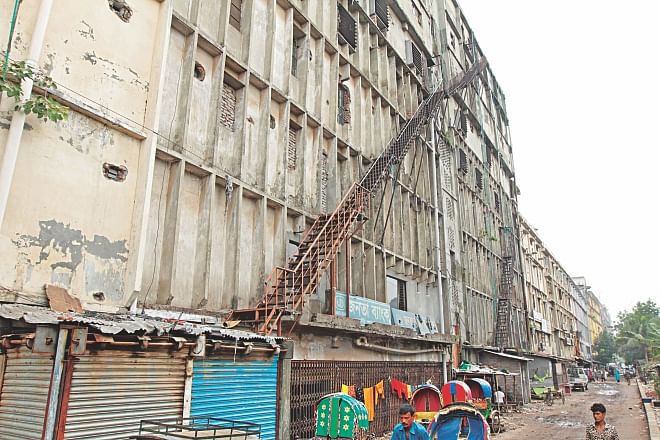Spanner in factory safety efforts
Spanner in factory safety efforts
Buyers, RMG makers at loggerheads over who to inspect

A rift has opened up between retailers and garment manufacturers over factory inspection standards -- a development that threatens to derail the efforts to improve safety standards in factories.
Garment makers have termed very stringent the inspection standards of the Accord on Fire and Building Safety in Bangladesh, a platform of European-led 150 clothing retailers and brands, categorically opposing the hiring of foreign engineers.
The clauses making mandatory the use of sprinkler system and thick electrical coils at factories have also become a moot point.
The latest disagreement surfaced after the European retailers said they would begin today inspection of the supplier factories with foreign experts and engineers.
Rob Wayss, executive director of Bangladesh operation of the Accord, said 37 foreign experts have been hired for the inspection.
"Gradually, we will recruit engineers and experts from Bangladesh,” he told The Daily Star over the phone yesterday.
Wayss said he had a meeting on Sunday with more than 400 garment factory owners at the BGMEA office in the capital to discuss how the standards can be followed.
"We had a long discussion and many owners opposed the standards. But the standards have been set to ensure safety of the workers."
He admitted that some standards are stricter than those in the country's national building code. "But we have to follow those clauses for the safety of the workers. And experts have suggested the standards.”
The panel will initially inspect 200 factories, and plans to complete the inspection of 1,500 factories by September this year. Its engineers will identify safety problems in the factories, draw up recommendations to improve safety, and set a deadline for the owners to implement the necessary measures.
“We have already contacted the factories to be inspected by our teams,” sais Wayss.
Atiqul Islam, president of Bangladesh Garment Manufacturers and Exporters Association (BGMEA), said the Accord has already floated an international tender to hire foreign engineers, and most of them will come from four countries, including Scotland and South Korea.
“Why should they hire foreign engineers? Is there any shortage of qualified engineers in Bangladesh?” he told a meeting of garment makers at the BGMEA office yesterday.
He said the garment industry is now under threat. "On the one hand, we have been put under tremendous pressure from the Accord and the Alliance to improve factory environment. On the other hand, international retailers haven't yet increased unit prices."
Talking to The Daily Star, Shahidullah Azim, vice-president of the BGMEA, said they don't agree with some of the standards set by the Accord.
“We have objections to some clauses as many factories will not be able to meet the strict standards. Everything should be done according to the law of the land.”
Many small and medium factories will be in trouble, as they don't have the financial strength to follow the strict standards, said Azim.
The Accord has already set the standards for setting up sprinkler systems in factories, and installing thick electrical coils that are not produced in the country.
“We should sit together to set a common standard for inspection,” he said.
Speaking at the meeting, local experts also opposed the hiring of foreign engineers.
M Shamim Z Bosunia, president of the Institution of Engineers, Bangladesh, said the country has many competent professionals to inspect factory buildings.
“We condemn the plan to hire foreign engineers for inspecting garment factories.”
Jamilur Reza Choudhury, a former professor of civil engineering at Bangladesh University of Engineering and Technology, said no foreign engineers should be allowed to inspect factories unless they prove their skills and expertise.
"The engineers of the Accord and the Alliance have to be registered with local professional bodies," said Jamilur, also vice chancellor of the University of Asia Pacific.
Housing and Public Works Minister Mosharraf Hossain said the government wouldn't permit any foreign engineers to inspect factories if they fail to get registered with local professional bodies such as the IEB or the Buet.
Speaking to The Daily Star, Labour Secretary Mikail Shipar, however, welcomed the stringent inspection procedures.
“We cannot compromise on the standards at the expense of the lives of our workers. If they can ensure workers' safety with stringent standards, let them do it. Let them start inspection first."
The bureaucrat said the government has convened a meeting of representatives of the International Labour Organisation, the BGMEA, the Accord, and the Alliance for Safety of Workers in Bangladesh to discuss the factory inspection standards.
Retailers and brands, mostly from Europe, signed the legally binding Accord in May last year, after Bangladesh saw two industrial disasters -- the deadly Tazreen Fashions fire and Rana Plaza collapse.
In a separate move, 26 US-based retailers and brands formed the Alliance for inspecting 700 factories.
The garment sector came under global spotlight following the two incidents in a span of less than five months.
The tragedies that cost the lives of at least 1,240 people, mostly garment workers, highlighted poor safety track record with most factories lacking basic safety equipment such as sprinklers and fire escapes on every floor.